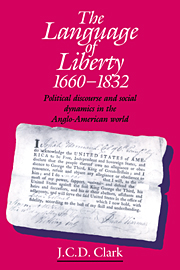 The Language of Liberty 1660–1832
The Language of Liberty 1660–1832 Published online by Cambridge University Press: 29 December 2009
LAW, RELIGION AND SOVEREIGNTY
By the mid-eighteenth century, Englishmen on both sides of the Atlantic proclaimed their faith in liberty: they appealed to a common constitutional tradition even as they disputed its ownership and its application. They claimed the ‘rights of Englishmen’ and revered the texts in which they believed them to be embodied, like Magna Garta and the Bill of Rights. They commemorated a similar Protestant calendar of momentous anniversaries, including the Spanish Armada, the Gunpowder Plot, the execution of Charles I, and the birthday of the reigning monarch. They celebrated, and suspected a minority who were ambiguous about, the Restoration, the Glorious Revolution, the Act of Settlement, and the accession of the House of Hanover. They structured the political lives of their communities around representative institutions, and had the Westminster Parliament in mind as a model. As the Scots and Irish in the New World and the Old were progressively caught up in this hegemonic English myth, they too were drawn to subscribe to it and loudly profess it in order to exploit its libertarian implications: they were implications to which their very different sectarian and political traditions also pointed. Law and religion dominated men's understanding of the public realm.
Englishmen on both sides of the Atlantic received, and idealised, the common law. Law was, nevertheless, an area in which transatlantic discourse broke down, and this book explores, on a theoretical level, one of the pathways along which this process developed. On a practical level, much more might be said.
To save this book to your Kindle, first ensure no-reply@cambridge.org is added to your Approved Personal Document E-mail List under your Personal Document Settings on the Manage Your Content and Devices page of your Amazon account. Then enter the ‘name’ part of your Kindle email address below. Find out more about saving to your Kindle.
Note you can select to save to either the @free.kindle.com or @kindle.com variations. ‘@free.kindle.com’ emails are free but can only be saved to your device when it is connected to wi-fi. ‘@kindle.com’ emails can be delivered even when you are not connected to wi-fi, but note that service fees apply.
Find out more about the Kindle Personal Document Service.
To save content items to your account, please confirm that you agree to abide by our usage policies. If this is the first time you use this feature, you will be asked to authorise Cambridge Core to connect with your account. Find out more about saving content to Dropbox.
To save content items to your account, please confirm that you agree to abide by our usage policies. If this is the first time you use this feature, you will be asked to authorise Cambridge Core to connect with your account. Find out more about saving content to Google Drive.